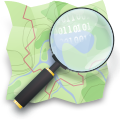This article contains promotional content .(December 2025) |
| StreetComplete | |
|---|---|
 | |
 | |
| Original author | Tobias Zwick (westnordost) |
| Initial release | 2017 |
| Stable release | |
| Repository | StreetComplete on GitHub |
| Written in | Kotlin |
| Platform | Android, an iOS Version is planned |
| Type | GIS software |
| License | GNU General Public License 3.0 |
| Website | streetcomplete |
StreetComplete is an easy to use OpenStreetMap editor that can be used without prior knowledge about OpenStreetMap. [2] [3] The app prompts users to answer questions like "What are the opening hours here?" or "Is this still here?" about places and objects in their surrounding. Answering these questions helps to keep the OpenStreetMap database complete and up to date. [4] [5]

